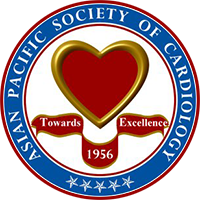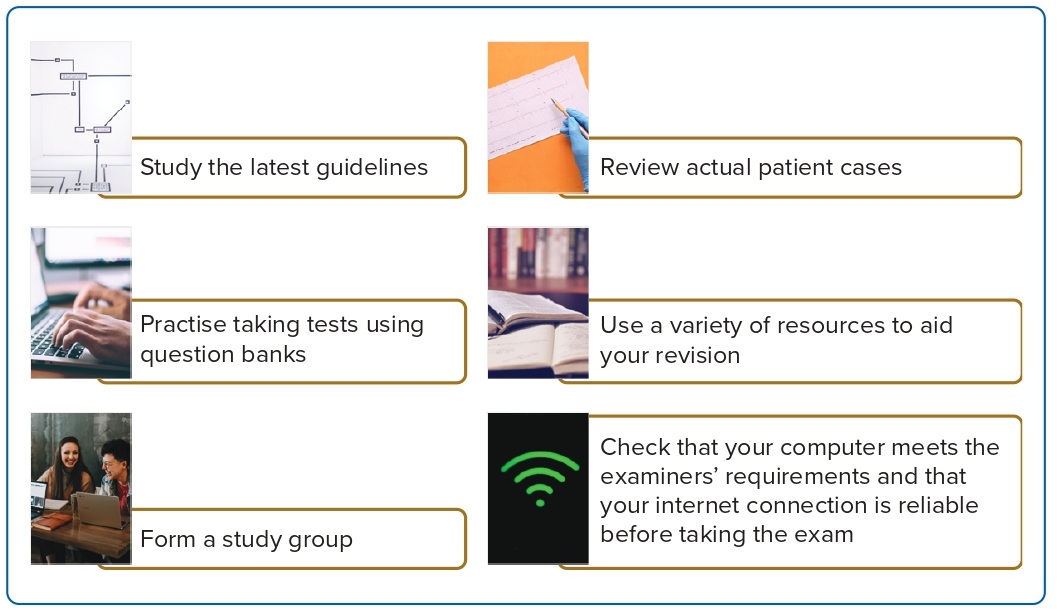The European Examination in Core Cardiology (EECC) is an annual examination that provides a broad, balanced and up-to-date test of the core knowledge required by cardiology speciality trainees for independent practice.1 It assesses knowledge from the European Society of Cardiology (ESC) Core Curriculum for the Cardiologist.2
The Asian Pacific Society of Cardiology (APSC) is an umbrella organisation representing 22 cardiology societies in the Asia-Pacific region.3 There is no uniform cardiology subspeciality course to assess the core cardiology knowledge of trainees in the region. Hence, the APSC approached the ESC in 2020 to pilot the EECC among cardiac societies that are members of the APSC, to be known as the APSC exit examinations. It was decided that examinees from member countries of the APSC would take the same examination as European examinees. Countries participating in the examinations register in the September preceding the examination year, and need to register their candidates who are starting in November. This article aims to help trainees prepare for this examination which is taken over 3 hours online with remote proctoring.
APSC Exit Examinations: Content and Format
The 120 examination questions test knowledge from the ESC core curriculum in line with current guidelines and published clinical studies. The questions cover the following four sections:
- imaging and valvular heart disease;
- rhythm disorders;
- coronary artery disease, acute cardiovascular care, prevention, rehabilitation and sports; and
- heart failure and cardiac patients in other settings.
Each question comprises a short clinical scenario and a single multiple-choice question with five possible answers shown in alphabetical order (Box 1).4 Factual memory, interpretation and clinical reasoning are required to answer each question. About 70% of the questions comprise only text and the others contain images or short video clips.
Candidates need to be able to remember aspects of basic science relevant to cardiology and ESC guidelines that support clinical practice. Basic science questions test the understanding of cardiovascular investigations, medications and procedures. It is primarily gathered from textbooks (which may be accessed electronically) and includes anatomy, physiology and pathophysiology of disease states. Guideline-based questions require factual recall of clinical practice guidelines. To be able to answer guideline-based questions correctly, it is necessary not just to know the actual guideline recommendations but also the evidence that underlies these recommendations, including landmark clinical trials and any recent changes in the recommendations due to developments in ongoing trials.
Box 1. Recommended Resources
- Guidelines from the European Society of Cardiology (ESC) (essential) and American Heart Association/American College of Cardiology; consensus statements, e.g. from the European Heart Rhythm Association
- Textbooks, such as The ESC Textbook of Cardiovascular Medicine and Braunwald’s Heart Disease Review and Assessment
- Courses, such as the Mayo Clinic Cardiovascular Board Review or the Cleveland Clinic Intensive Review of Cardiology
- Online webinars that can be accessed through the ESC
- Cardiology congresses – try to focus on late-breaking clinical trial sessions to look for potential practice-changing recommendations
- Question banks
- European Examination in Core Cardiology introductory course, which includes a 60-question mock exam
- ESC e-learning platform, which includes a section called ‘Test your ESC clinical practice guideline knowledge’ section)
- An online question bank of 485 cardiology questions at StudyPRN www.studyprn.com
- ACC’s ACCSAP https://www.acc.org/ACCSAP
- ESC 365: https://esc365.escardio.org/home
- MCQs for Cardiology Knowledge Based Assessment (Oxford Higher Specialty Training)
- High-impact journals, such as New England Journal of Medicine, European Heart Journal, Journal of the American College of Cardiology, Circulation
- ESC 365: https://esc365.escardio.org/home
- Resources from the British Cardiovascular Society ) and the British Junior Cardiologists’ Association
Candidates are tested on their ability to interpret cardiovascular data such as coronary angiograms, echo, MRI, CT, nuclear scans and ECGs. Courses, online question banks and case reports in journals can be useful resources for candidates to increase their exposure to this form of data interpretation.
In the clinical vignette included in all questions, candidates should process clinical information, analyse the clinical scenario and make a clinical judgement to choose the best answer. This tests the application of the information learned from the basic sciences and guidelines. Clinical reasoning questions have clinical settings that are commonly encountered in day-to-day practice, but there are also questions about uncommon or rare cases.
Preparation
The questions in the EECC examination are based on the latest evidence, so the daily evidence-based practice of cardiology helps candidates prepare to take the test. The diverse and complex scenarios faced in everyday practice, along with constant review of the evidence and recommendations for treating these conditions, will help candidates broaden and deepen their knowledge base.
Candidates should familiarise themselves with the format of the examination 3–6 months before the exam date. This preparation should involve accessing ESC-specific recommended resources, such as the EECC introductory module, which includes direct access to guidelines, webinars, presentations and relevant sections of the ESC textbook, ESC 365, example questions aligned to the topics of the ESC core curriculum, and a 60-question mock exam in the same format using the same software as the real exam. Other study materials are available from websites such as StudyPRN (www.studyprn.com), although questions are not in the EECC format (Box 1).
Candidates are advised to study current guidelines, focused updates and consensus documents as the foundation of their revision. These are best gathered from guideline publications, review articles and academic journals. Memorising multiple guidelines can be challenging and time-consuming so candidates are advised to apply these guidelines together with their clinical judgement during their day-to-day practice to reinforce learning.
Candidates should also acquaint themselves with various clinical case presentations. Cases may have multiple management options so it is important to learn how to systematically choose the best answer while considering various clinical factors. This helps candidates prepare for questions with multiple answers which appear plausible. Reading academic journals with case scenarios and discussion points can facilitate this form of learning. When encountering real patients, candidates should try to create clinical questions from the case to answer to reinforce their conceptual learning.
Candidates should also review real-life videos and images of diagnostic modalities to correlate clinical presentations with diagnostic findings and therapeutics. It is imperative to be thoroughly familiar with principles, applications and interpretation of echocardiography (transthoracic, trans-oesophageal and stress echocardiography), cardiac MRI, cardiac CT, nuclear cardiology and coronary angiography. Books and online resources for each modality are available (Box 1), although the breadth of information found in these materials may far exceed what is required in the EECC, so candidates are advised to focus on the types of cases they see in daily practice or on diseases that are most commonly seen in general cardiology to facilitate high-yield learning.
Candidates should practice multiple choice tests using question banks. None of the available resources contain specific questions that will appear in the EECC and new questions are written every year. Hence, attempting to ‘question spot’ does not add value to the candidate’s examination preparation or overall learning. When they answer the questions in practice examinations wrongly, candidates are advised to find out the correct answer by reviewing the source material or other references. Review courses and other online resources may also be useful.
The ESC offers an online introductory course that primes candidates about the components of the exam and provides a mock examination at the end of the course. If possible, candidates are encouraged to join the ESC to access the learning programmes available online, including the ESC e-learning platform. Once registered for the EECC examination, the ESC gives full access to the introductory module.
Group study is helpful and candidates may establish one or more study groups to benefit from each other’s learning. For example, each study member can focus on a specific topic. A good way to learn is by teaching, so try explaining concepts to the rest of the study group or to junior colleagues or medical students.
Tips to Facilitate Exam-taking
Candidates are strongly encouraged to review all the materials on the EECC webpages of the ESC (https://www.escardio.org/Education/Career-Development/European-Exam-in-Core-Cardiology-(EECC)) and European Union of Medical Specialists (http://www.uems-cardio.eu/index.php/initiatives/eegc). Once registered, you will need to book your exam time and check that your computer is compatible and able to access the examination platform. Since the exam is carried out online, candidates are encouraged to go through the rules and regulations of the examination a few days before their exam date and follow all the instructions for the examination. Locate and prepare a suitable examination room. Take the examination in a quiet room with a good internet connection. It is advisable to have a backup internet connection and to avoid being post-call or on-call during the examination schedule. The entire room, including the entry and exit points, will have to be shown to the remote proctor prior to the actual examination.
During the examination, read the questions thoroughly before answering. There is an average of 90 seconds per question, which is enough time, but it is advisable to make full use of the time to check your answers. Candidates will not be allowed to leave the computer during the 3-hour examination and no bathroom breaks are allowed.
The examination software includes a calculator and normal ranges are available. However, normal values may sometimes be expressed in one type of unit, e.g. in metric units. Hence, candidates should be familiar with the conversion of common laboratory values, which may save some precious time during the exam.
We hope that these tips and suggestions, summarised in Figure 1, will help readers confidently prepare for the EECC/APSC Exit Examination, which is one of the first steps in a lifetime of progressive professional development in the practice of cardiology. Good luck! 











